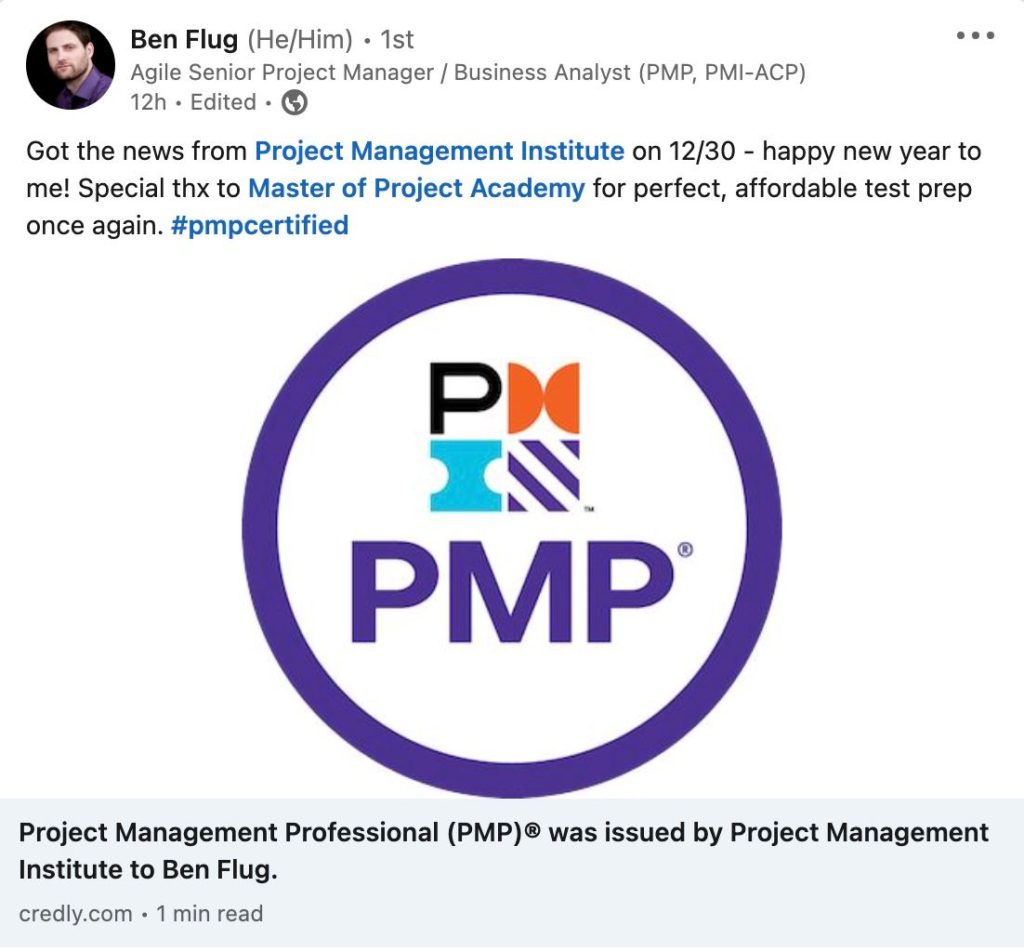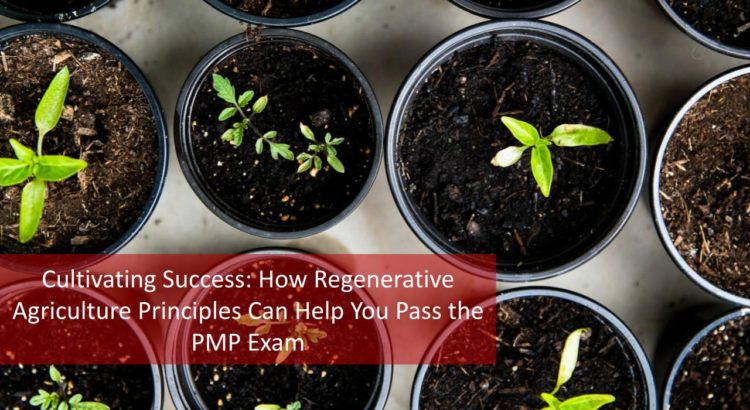In a world where both sustainable practices and efficient project management are becoming increasingly vital, there’s a unique intersection between regenerative agriculture and the Project Management Professional (PMP) certification. At first glance, these two fields might seem unrelated, but the principles that make regenerative agriculture successful can also be applied to your PMP exam preparation and project management practices. Let’s explore how cultivating the land and cultivating your project management skills share common ground.
- Read Sanjay’s PMP Journey: “How I passed the PMP Exam in 20 days”
The Roots of Regenerative Agriculture
Regenerative agriculture is more than just a farming method; it’s a holistic approach aimed at restoring and enhancing the entire ecosystem. By focusing on soil health, biodiversity, and sustainable practices, regenerative agriculture seeks to work with nature rather than against it.
Key Principles:
- Soil Health Restoration: Improving soil fertility through organic matter and microbial activity.
- Biodiversity Enhancement: Promoting a diverse range of species for a balanced ecosystem.
- Minimal Soil Disturbance: Reducing tillage to preserve soil structure.
- Cover Cropping: Using cover crops to protect and enrich the soil.
- Integrating Livestock: Incorporating animals to improve nutrient cycling.
- Water Management: Enhancing water retention and reducing runoff.
What Project Managers Can Learn from Cowboy Culture?
Bridging Regenerative Agriculture and Project Management
Just as a farmer nurtures the land to yield bountiful harvests, a project manager cultivates resources and teams to achieve project success. Here’s how the principles of regenerative agriculture align with the PMP framework:
1. Soil Health Restoration and Project Foundation
Analogy: Healthy soil is the foundation of productive agriculture, much like a solid project foundation is essential for success. Check out the number 1 tool for project management: Project Management Plan.
Application: In project management, this translates to thorough project initiation and planning. Defining clear objectives, scope, and stakeholder expectations lays the groundwork for a successful project, just as enriching the soil prepares it for planting. Check out a sample project management plan.
2. Biodiversity Enhancement and Team Dynamics
Analogy: A diverse ecosystem is more resilient and productive.
Application: Building a diverse project team with varying skills and perspectives enhances problem-solving and innovation. Embracing diversity aligns with the PMP’s emphasis on team management and stakeholder engagement.
Are Your Stakeholders Missionaries or Mercenaries?
3. Minimal Soil Disturbance and Risk Management
Analogy: Reducing soil disturbance preserves its structure and health.
Application: Minimizing disruptions in a project—through careful planning and risk management—maintains momentum and preserves resources. Anticipating risks and implementing mitigation strategies are key components of the PMP exam and real-world project management.
Read more about the Shocking Cost of Ineffective Project Management
4. Cover Cropping and Continuous Improvement
Analogy: Cover crops protect and enrich the soil during off-seasons.
Application: Continuous learning and process improvement protect and enhance a project’s value over time. Utilizing lessons learned and implementing best practices are crucial for ongoing success and are emphasized in the PMP curriculum.
How to earn PDUs and elevate your skills with MoPA training courses and special offers?
5. Integrating Livestock and Cross-Functional Collaboration
Analogy: Livestock integration improves nutrient cycling and ecosystem health.
Application: Encouraging cross-functional collaboration improves communication and efficiency within a project. Integrating different departments or specialties can lead to more cohesive and successful project outcomes.
6. Water Management and Resource Optimization
Analogy: Effective water management enhances soil hydration and resilience.
Application: Efficient resource management—including time, budget, and materials—is essential in project management. The PMP exam tests your ability to optimize resources, much like a farmer optimizes water usage for crop success.
What is the PMP Passing Score? Focus on the ECO for Success!
Applying Regenerative Principles to PMP Exam Preparation
Preparing for the PMP exam requires dedication, strategy, and a holistic approach—much like regenerative agriculture.
Cultivate Your Knowledge Base
- Enrich Your “Soil”: Deepen your understanding of PMP concepts through comprehensive study materials and courses.
- Master the Material with Three Key Steps: Actively Engage, Reinforce, and Apply
To enhance your grasp of the material, follow these three essential steps for knowledge retention and application:
1. Actively Engage with Diverse Resources: Immerse yourself using a variety of tools—books, online courses, and study groups—to fully understand the concepts.
2. Reinforce Learning Through Repetition: Regularly review and practice what you’ve learned to strengthen memory retention.
3. Apply Knowledge Practically: Implement what you’ve studied in real-world scenarios or practice exams to solidify your understanding and prepare for the PMP exam.
- Our exclusive “Sandbox,” membership includes real-like case studies so that you can improve your project management skills.
Minimize “Disturbances”
- Reduce Distractions: Create a study plan that minimizes interruptions, allowing you to focus and retain information.
- Manage Risks: Identify potential obstacles in your study schedule and develop strategies to overcome them.
Unlock Your PMP Potential with Master of Project Academy’s Instructor-Led Training
Participating in Master of Project Academy’s Instructor-Led 35 Hour PMP class offers a comprehensive and immersive learning experience that enhances your ability to retain and apply project management knowledge effectively. The live, interactive sessions allow you to engage directly with expert instructors, facilitating immediate clarification of concepts and fostering a deeper understanding of the material. This real-time interaction promotes active learning, which is proven to improve memory retention. Additionally, the structured curriculum aligns with the PMP exam requirements, ensuring that you’re not only absorbing information but also learning how to apply it in practical, real-world scenarios. The collaborative environment encourages discussions and knowledge sharing among peers, further enriching your learning experience and preparing you to confidently tackle the PMP exam and future project management challenges.

Integrate and Collaborate with Expert Mentorship
- Enroll in Personalized Coaching: Take advantage of Master of Project Academy’s PMP Coaching and MentorshipProgram to receive one-on-one guidance from PMP-certified professionals. This tailored support can help you navigate the complexities of the PMP exam with confidence.
- Engage with a Community of Learners: Collaborate with peers and mentors through the coaching service to gain diverse insights and perspectives. This interactive approach enhances your understanding and prepares you for real-world project management challenges.
Continuous Improvement
- Practice Exams: Regularly take practice tests to assess your knowledge and adjust your study plan accordingly. Check out our PMP Exam Simulator.
- Reflect and Adapt: After each study session, reflect on what you’ve learned and where you can improve.
Reaping the Harvest: Success on the PMP Exam
By applying the regenerative approach to your PMP exam preparation, you’re not just aiming to pass a test—you’re cultivating skills that will benefit your entire project management career. This holistic method ensures you’re well-prepared, resilient, and adaptable, ready to tackle complex projects with confidence.
Conclusion
Regenerative agriculture teaches us the value of working with natural systems to achieve sustainable growth. Similarly, embracing these principles in your PMP exam preparation and project management practices can lead to profound professional growth. By nurturing your foundational knowledge, embracing diversity, minimizing disruptions, and committing to continuous improvement, you’re setting yourself up for a bountiful harvest of success.
Ready to cultivate your project management skills? Enroll in our comprehensive PMP certification courses at Master ofProject Academy and start your journey toward becoming a certified Project Management Professional today!
